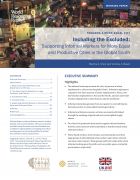Including the excluded: supporting informal workers for more equal and productive cities in the Global South
 A small but growing number of cities are adopting more inclusive approaches to informal workers and this offers important lessons for cities that seek a more equal, productive and environmentally sustainable future. Informal workers account for 50 to 80 percent of urban employment and generate from 25 to 50 percent of the (non-agricultural) gross domestic product of the global south. Yet they are largely excluded from public infrastructure and services, public space, and public procurement contracts. The working paper examines different approaches that cities have taken towards the informal self-employed workers and their livelihood activities. After presenting recent data on the size, composition, and contribution of the informal economy, the paper highlights a series of actionable areas for urban change agents to make cities more inclusive and productive.
A small but growing number of cities are adopting more inclusive approaches to informal workers and this offers important lessons for cities that seek a more equal, productive and environmentally sustainable future. Informal workers account for 50 to 80 percent of urban employment and generate from 25 to 50 percent of the (non-agricultural) gross domestic product of the global south. Yet they are largely excluded from public infrastructure and services, public space, and public procurement contracts. The working paper examines different approaches that cities have taken towards the informal self-employed workers and their livelihood activities. After presenting recent data on the size, composition, and contribution of the informal economy, the paper highlights a series of actionable areas for urban change agents to make cities more inclusive and productive.
